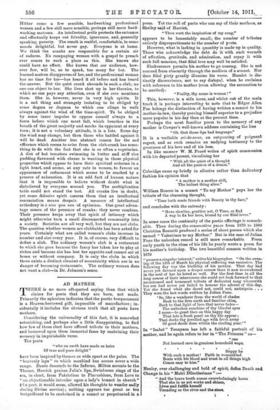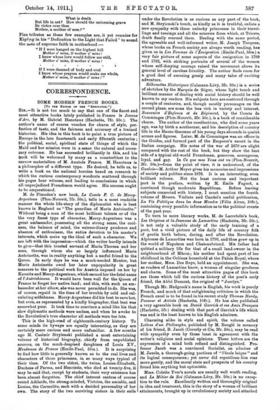AD ALATREM.
THERE is no more oft-quoted saying than that 'which claims for poets that they are born, not made. Primarily the aphorism indicates that the poetic temperament is a Heaven-bestowed gift, impossible of manufacture ; in- cidentally it includes the obvious truth that all poets have mothers.
Considering the universality of this fact, it is somewhat astonishing, and perhaps also a little disappointing, to find how few of these elect have offered tribute to their mothers, and bestowed upon them immortal fame by enshrining their memory in imperishable verse.
The poets "who on earth have made us heirs Of true and pure delight" have been inspired by themes as wide apart as the poles. The "heavenly lays" to which mankind has access cover a wide range. Dante descends to the Inferno, Milton mounts to the Throne, Herrick praises Julia's lips, Swinbnrne sings of the Bea, in short, from Patriotism to Pincushions, from Love to "an objectionable intruder upon a lady's bonnet in church" (tie poet, it would seem, allowed his thoughts to wander sadly during Divine service); nothing appears too great or too insignificant to be enshrined in a sonnet or perpetuated in a
poem. Yet the roll of poets who can say of their mothers, as Shelley said of Harriet,
"Thou wert the inspiration of my song," appears to be lamentably small; the number of tributes entirely disproportionate to the number of poets.
However, what is lacking in quantity is made up in quality. Those who acknowledge the debt do it with such -warmth of affection, gratitude, and admiration, and repay it with such full measure, that filial love may well be satisfied.
Shakespeare permits his mother to go unsung. She is not rescued from obscurity through the medium of a sonnet. Nor does filial piety greatly illumine his verse. Hamlet is dis- tinctly discourteous, not to say disloyal, when he exclaims with reference to his mother (even allowing the accusation to be merited): "Frailty, thy name is woman !"
This, however, is a side issue, and whilst out of the main track it is perhaps interesting to note that to Edgar Allen Poe belongs the distinction of having written a sonnet to his mother-in-law, thereby proving himself superior to a prejudice more popular in his day than at the present time. Perhaps the most familiar poem to the memory of any mother is Cowper's well-known address containing the line "Oh that those lips had language."
It is a veritable eri-de-eceur, an outpouring of poignant regret, and as such remains an undying testimony to the
greatness of his love and of his loss.
In like manner W. M. Praed writes of spirit communion
with his departed parent, visualizing her "With all the quiet of a thought And all the passion of a dream."
Coleridge sums up briefly in allusive rather than dedicatory' fashion his opinion that
"A mother is a mother still, The holiest thing alive."
William Roscoe in a sonnet "To my Mother" pays her the tribute of the charming thought, "Time hath made friends with Beauty in thy face," and concludes with the entreaty :
" Move slowlier, gentlier yet, 0 Time, or find A way to fix her here, bound by our filial loves."
In some cases the continuity of the poetic offerings is remark- able. Thus during the consecutive years from 1870 to 1880 Christina Rossetti produced a series of short poems which she named "Valentines to my Mother." But in the case of Julian Pane the unbroken record is still more remarkable. From early youth to the close of his life he yearly wrote a poem for his mother's birthday. The two beautiful sonnets written in
1870
"possess a singular interest," writes his biographer. "On the even- ing of the 12th of March his physical suffering was excessive. The following day was the birthday of his mother. That day hid never yet dawned upon a deeper sorrow than it now re-awakened in the soul of her he loved so well. For the first time in all the long course of their intercourse she could not look forward to that accustomed and treasured tribute of dedicated song wherewith her son had never yet failed to honour the advent of this day. Yet she found what she dared not, could not, anticipate. . . • They were the last words written by Julian Pane.
• Bo, like a wanderer from the world of shades
Back to the firm earth and familiar skies, Back to that light of love that never fades— The unbroken sunshine of thy blissful eyes I come—to greet thee on this happy day
That lets a fresh pearl on thy life appear ; That decks thy jewelled age with fresh array • Of good deeds done within the circling year.'"
In "Isabel" Tennyson has left a faithful portrait of his mother, and he again refers to her in "The Princess" as—
"one Not learned save in gracious household ways.
• • •
Happy he With such a mother! Faith in womankind Beats with his blood and trust in all things high Comes easy to him."
Henley, ever challenging and bold of spirit, defies Death and Change in his " Matri Dilectissimae " :—
"And the brave truth comes overwhelmingly home
That she in us yet works and shines, Lives and fulfils herself
Unending as the river and the stars.
What is death But life in act? How should the untoeming grave Be victor over thee Mother, a mother of men?"
Fine tributes as these few examples are, it yet remains for Kiplin in his "Dedication to the Light that Failed" to sound the Bale of supreme faith in motherhood :—
"If I were hanged on the highest hill Mother o' mine, 0 mother o' shine!
I know whose love would follow me still, Mother o' mine, 0 mother o' mine !
•
If I were damned of body and soul
I know whose prayers would make me whole, Mother o' mine, 0 mother o' mine!"



















































 Previous page
Previous page